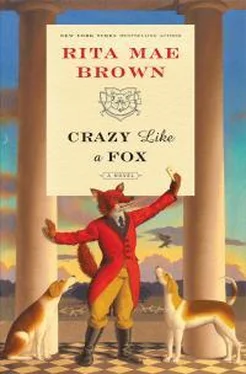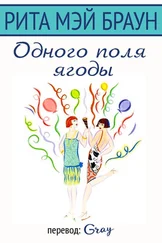Spying a larger putty knife, Sister grabbed it, hurried back, handed it up to Shaker.
“Got it!” He removed the brick, which was a façade with sides to hold it in place.
Reaching in, he delicately removed a black box that fit perfectly in the space. Stepping down, he handed it to Sister.
Sister realized this wasn’t a black box. “It’s silver. Tarnished.”
She opened it; the hinges were a bit stiff. Inside rested a velvet drawstring bag. Underneath that lay a heavy paper envelope, with exquisite handwriting in blue-black ink.
It read, “My Love.”
“Come on.” Sister led them back to the desks, where she gently removed the contents of the box.
“God,” Shaker exclaimed.
Tootie, wordless, picked up a stunning diamond-and-emerald necklace. The center emerald had to be seven carats. Each emerald to the sides of this, as they went up toward the clasp, was a reduction of about a half carat each, until close to the clasp, where two small emeralds surrounded by small diamonds flanked the clasp. The diamonds also diminished by a half carat each until this point.
A bracelet matched the necklace. A bounty of rings, with large stones of the precious and semiprecious varieties, rested on the desktop, along with a man’s Patek Philippe watch, paper thin, an alligator band, now cracked and dry, attached.
The three, mesmerized, were speechless.
Finally, Sister broke the silence. “I believe this is the first time these treasures have seen daylight in sixty-three years.”
Then she carefully lifted the envelope, the crème-colored paper still crisp, proving its highest quality.
They almost held their breath, then Sister flipped up the back of the envelope, which had been opened, removing the paper.
CHAPTER 27
Dear Wesley,
Fate threw us together. Fate tears us apart.
The happiest days of my life have been with you. The sound of your voice, the grace of your walk, your poetry on a horse, your devilish sense of humor, your kindness. I regarded being with a man as a duty. You showed it can be a joy.
Brenden would never give me a divorce. He values me as much as he values a new tractor, cherishes my old Virginia blood, which now flows through his sons. Of course, I have told him nothing. He barely notices me anyway, but I have been exhausted, sad. I’ve told him I need a bit of time away from Old Paradise. I will set sail to London, then Paris, wherever my fancy takes me. I will return to Toronto before coming home.
I will have the baby in Toronto. My college roommate, Ceil, has offered shelter and a home for the child. She and her husband, a wonderful man, a doctor, are unable to have children. She says I am the answer to her prayers. In a sense she is the answer to ours. Our child will be loved, will want for nothing.
You will be in my heart wherever I may be. Not a day will pass when I don’t long for you, want to hear your laugh, see the light in your eyes.
You gave me your hunting diaries when I told you I was going to have your child. You said, “Give them to our baby. He or she will know me a little.” I will take them with me. Read every word and then leave them with Ceil.
You, dear, are an extravagantly gifted huntsman. However, it is not a line of work that offers much remuneration. To your credit, you are not a spendthrift, but then what do you have to spend? You could be injured, unable to work. I pray that will never happen, for you were born to hunt hounds, to be outside, to be free of the petty, consuming drive for profit that twists so many men. But I wonder, if and when the day comes when you must retire, if you will have enough to buy a house, a bit of land?
You will not want to take anything from me. Take it. These are my grandmother’s and my mother’s jewels. Nothing here is from Brenden. It is all from my family and in truth, it is worth a fortune. Like our child, you will never want for anything. These jewels will provide for generations of Carruthers. I hope you have children. You will be a good father.
As I am already on my way to New York, to board the ship, you can’t return these anyway. And when I am back in Virginia, returning them will be difficult. We really can’t be seen alone. I will see you only in the hunt field. I suppose it is some consolation.
I would gladly give up everything for you: the money, Old Paradise, the empty status. But I cannot give up my sons, even though they are young men and no longer need a mother as once they did. Should I leave Brenden, he would turn my boys against me, find a way to keep them at Old Paradise. He’s not so much a bad man as a small one.
Fate is cruel.
My memories will be my own paradise and I will love you until the day I die.
Margaret
18 February 1954
“That poor woman.” Sister’s eyes misted.
“A different time.” Shaker felt sorrow for Margaret as well. “They would have been ruined. He would have lost his job as a huntsman. No other hunt would have hired him. A man has to have work, no matter how much he loves a woman. Fate was cruel.”
Tootie traced Margaret’s feminine signature with her forefinger. “She came back to find out Weevil had disappeared. Another blow.”
“A pity we can’t talk to her. She loved him so. Surely, she had a feeling, a sense of what truly happened to him.” Sister folded the paper, sliding it back in the envelope. “Love changes you.”
“Life changes you,” Shaker said.
Placing the jewelry back in the silver box, Sister couldn’t help winding the watch; she was rewarded with a ticking. “This is why you pay a fortune for these things.”
“Well, you get what you pay for,” Shaker remarked.
“This cost a bundle when it was new. It’s worth six figures today.” Sister kept up with values in jewelry, art, antique furniture, and horses, ever horses.
She liked knowing what things were worth—as Ray used to say, “What the market will bear.”
“Do we give this to the DuCharmes?” Shaker wondered.
“Never!” came the swift reply. “Never.”
Shaker, not arguing, asked, “Explain this to me.”
“This jewelry never belonged to the DuCharmes. Margaret was a Bradford, hence the old blood, 1607 blood. The jewelry belonged to her mother, her grandmother, and I suspect she bought the watch just for him. Brenden had nothing to do with any of it, and if she had intended it for Alfred and Binky she would have willed it to them. She gave them the jewelry that Brenden had bought her. I saw those jewels on her at the hunt functions. Brenden had good taste, I’ll give him that. Margaret was still alive when Ray and I inherited Roughneck Farm. A woman of peculiar elegance and quietness. Now I know why. She never got over Weevil.” Sister felt the weight of the silver box. “Shaker, get back up on that ladder and put this where we found it. You can get the façade brick to stay put. It was reliable for sixty-three years; it will be reliable now.”
Back they walked, ladder in place. He climbed up and she handed him the box, which he slid into the space, then jiggled and tapped the brick front into place.
“Thank you,” Sister said as he climbed down.
“So this is why Weevil stole his horn? For the map.” Shaker folded the ladder, leaning it against the brick pillar.
The day, perfect October weather, felt wonderful.
“But Weevil knows where the jewelry is. He drew the map.” Tootie looked up at the brick; you really couldn’t tell.
“Then why doesn’t he reclaim it?” Shaker asked a reasonable question. “I mean, if he has the horn, which he does.”
Thinking, Tootie wisely noted, “How can he? If he comes here with a ladder, if he gets anywhere near the kennel, the hounds will blow up. We’ll all know. He’ll be caught red-handed.”
Читать дальше












